Shukriya and her husband huddled together at the bottom of a deep trench on the Turkish-Iranian border. It was summer and the days were hot. Around them were other Afghan families and their children, some of whom had improvised tents out of shawls and scarves to stave off the punishing glare of the sun.
Water was scarce and the stench of excrement and bodies packed close together had made Shukriya, three months pregnant, nauseous and sick. Everyone, infant babies included, crouched in silence as they waited for the smugglers to return. They had led the scared families to the trench four days earlier, promising to come back soon and take them across a heavily fortified border wall built to deter people like them from entering Turkey.
About 300,000 people are estimated to have made the perilous journey from Afghanistan to Turkey since western forces withdrew and the Taliban regained power.
Shukriya’s own journey began in the last week of July 2021, when the Taliban closed in on her home town of Herat in north-west Afghanistan. She and her husband, Nur-Mohamad, had to make a quick choice: stay and relive the past under Taliban rule, or join the hundreds of thousands of Afghans fleeing the country into an unknown future.
The couple were in their late 20s and had lived a modest life in the city. Nur-Mohamad was a policeman, and Shukriya, who had dropped out of university to support her family, worked as a tailor and a hairdresser. Nur-Mohamad’s brother, however, had been a Arbaki [militia] commander who provided protection and escorted supply convoys to military bases in Kandahar and Helmand, often clashing with the Taliban. Nur-Mohamad had taken part in these skirmishes and even commanded the unit for a brief time after the Taliban killed his brother. This made him a target too, and the Taliban frequently sent him threatening messages.
“I never thought the Taliban would come back,” Shukriya said. “But when we saw them occupy other provinces, we decided to run away. We took nothing but the clothes on our backs.”
Their first stop was Nimruz province bordering Iran, where they contracted a smuggler. They left the next night, part of a large group of refugees, on a long, perilous journey. Vulnerable refuges, especially women travelling alone, were targeted by criminal gangs along the route.
“We walked for six nights,” Shukriya said. “During the day, we slept under trees in the shade of rocks. There were many children with us; some did not even have shoes, all walking out of the country.” The hardest thing, she said, was finding water in the parched and hilly terrain. “We had to drink any foul water we found in puddles or canals. I was pregnant and vomiting.”
After they reached the Iranian town of Zahidan, another smuggler crammed them into a bus and drove them to the north-western city of Uromya. Their final destination was Turkey.
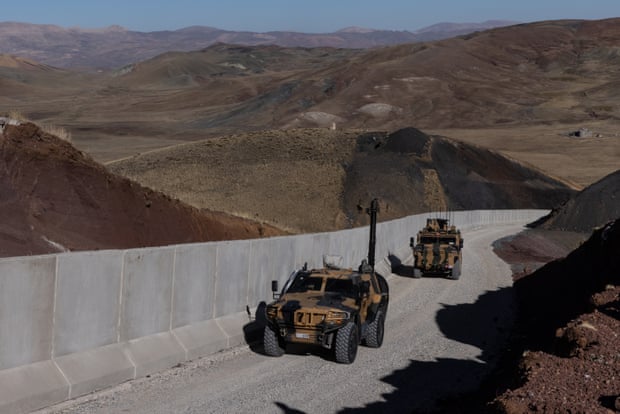
However, authorities in Ankara, scarred by the mass arrival of refugees from Syria, were determined to keep them out, erecting a barrier on the border with Iran even before the fall of Kabul. It consisted of a four-metre deep trench, a concrete wall topped with razor wire, watch towers, monitoring platforms fitted with thermal cameras, and constant armed patrols.
After a 24-hour journey packed into a small bus, Shukriya and her husband arrived in a small town near the Iran-Turkey border where they spent a week waiting before they were led towards the wall. People held on to each other as they slid down to the bottom of the trench. Children were dangled to parents waiting below, and everyone cowered in the darkness.
Five days later, the smugglers returned. They had identified a safe spot to cross from. Shukriya said her feet were so swollen that she could hardly walk, and when they started climbing the high concrete wall using ladders, she thought that would be the end of her and her child. “I felt I was going to die. Even today, I can’t find words to describe my journey.”
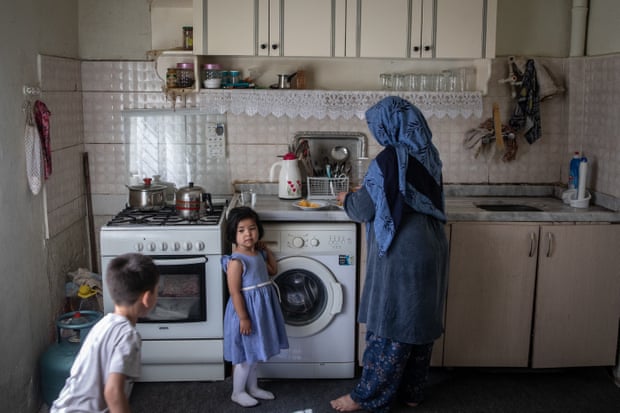
On the other side of the border, in the Turkish city of Van, they were rounded up and arrested, put in camps and threatened with deportation. She pleaded with the camp authorities and told them she was pregnant. She said that when refugees were pushed back to Iran, they were at their most vulnerable and would fall prey to bandits. “The risks are not only about kidnapping,” Shukriya said. “But sexually harassing women and girls who travel alone. I had seen it happen in front of me.”
The Turkish officials took pity on them and issued them with temporary papers.
Shukriya and her husband had imagined that after fleeing the Taliban the world would come to their aid. Instead, they found themselves trapped in Turkey, unable to settle and work without permits yet not allowed to move anywhere else.
In Istanbul, which is home to a large Afghan community, the couple now live in a small, stuffy, hot attic flat with a thin metal roof. On the edge of the sofa, wrapped in blankets, sleeps their baby daughter. She was born prematurely and had to spend four months in hospital. After the $3,000 payment to the smugglers to bring them here, the hospital bill used up the remainder of their savings. Now they can’t afford to buy her medicine. Fearing deportation when their temporary papers expire, Nur-Mohamad rarely leaves the flat and the family survives on whatever income Shukriya can make as a hairdresser, joining an army of destitute refugees inhabiting Istanbul.
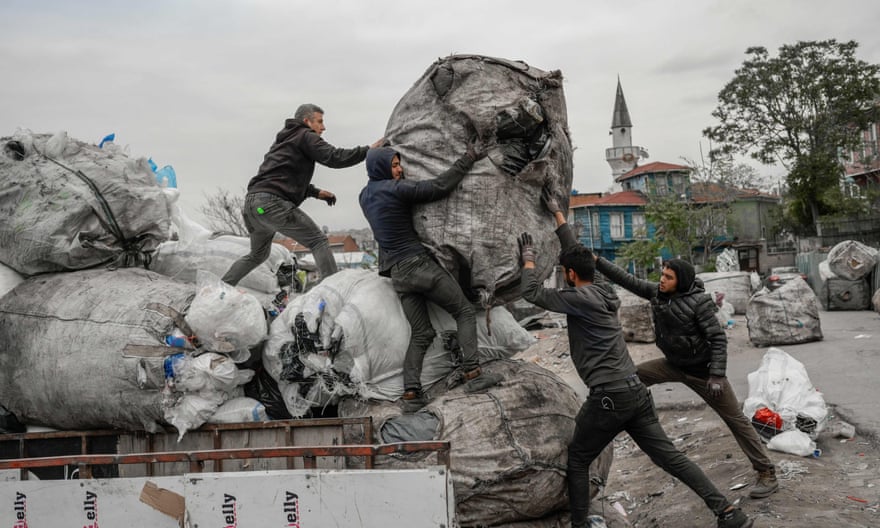
ON THE OUTSKIRTS of Istanbul down a dusty alleyway in a hilly neighbourhood of factories and warehouses, 50 young Afghans work, live, eat and sleep inside a workshop manufacturing travel bags.
The foreman, a short and thin man called Habibullah, pointed at the workers bent over their workstations and said with apparent pride that they were all Afghan. Some as young as 14 glued and stitched zippers, while others fed sacks of small plastic pellets into a large ovenlike machine that churned out plastic sheets. He said the factory operated 24 hours a day, seven days a week, producing 800 bags daily, with the men working on 12-hour rotations. He was shouting to make himself heard over the Afghan music blaring so loud from two large speakers that they drowned the screeching din of machinery.
Back in Afghanistan, the foreman had been a high school teacher in the eastern province of Khost, where he ran a small grocery shop. He arrived in Turkey seven months ago, he said, fleeing Afghanistan’s desperate economic situation. His district had fallen to the Taliban three years ago, and he knew when they started their offensive to capture the rest of the country that eventually all of Afghanistan would suffer a similar fate. So he sold the family cow, borrowed some money, and embarked on the arduous journey to Turkey.
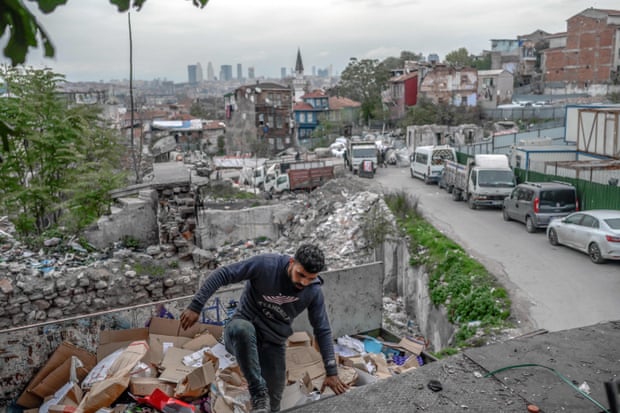
When he arrived in Istanbul, he stayed with friends for a few days before finding a job. He said young Afghans were arriving every day, but that increasing numbers were being deported by the police who had stepped up raids in areas popular with refugees. So he and his fellow workers now rarely leave the factory floor. “We can’t go [outside]. We are confined here, because if the police arrest us, we will be sent back to Afghanistan.”
Six months ago, the foreman himself was arrested; it was just before authorities began deporting Afghan refugees on charter flights. He spent two weeks in a prison camp and then two weeks later, he and other Afghans were put on a bus and driven to the Turkish city of Edirne, on the Greek-Turkish border. “The officers took us to the edge of the woods and told us: ‘That’s Europe, go fuck off,’” he said. “Some of us went to Greece, but they were arrested by the police there, beaten up, stripped naked and sent back. I just came back to Istanbul.”
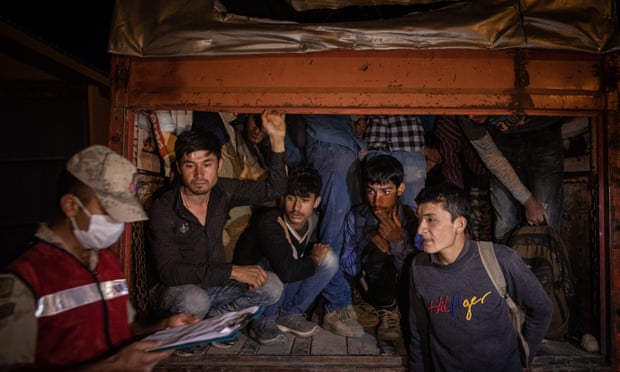
Turkey, which hosts nearly 4 million refugees – mostly Syrians, along with a few hundred thousand Afghans and other nationalities – followed a lenient migration policy for a long time. Obtaining a short-term residency in Turkey was a straightforward and simple process, unlike elsewhere in the region, let alone compared with Europe.
However, Turks, facing a worsening economic situation with high inflation and a slump in the value of the lira, have directed their resentment towards refugees – mainly Syrians and Afghans – accusing them of stealing jobs and increasing rents. With polls showing that most Turks want refugees to be sent back home, politicians on the right and left, with an eye on the coming parliamentary and presidential elections, are seizing on the popular anger to attack the ruling AK party’s migration policy.
The most ardent voice has been that of a rabid rightwing parliamentarian, Ümit Özdağ, whose newly founded Victory party is gaining popularity. Özdağ claims that the refugees constitute an invasion army, part of an international conspiracy to destroy the Turkish nation. The party is still marginal, but as with elsewhere in Europe, extreme rightwing politicians are forcing mainstream parties to adopt their language and rhetoric to appease the public. It is now extremely hard to obtain the cherished residency card, even for those Afghans who arrived in the country legally and can prove that they have a comfortable income.
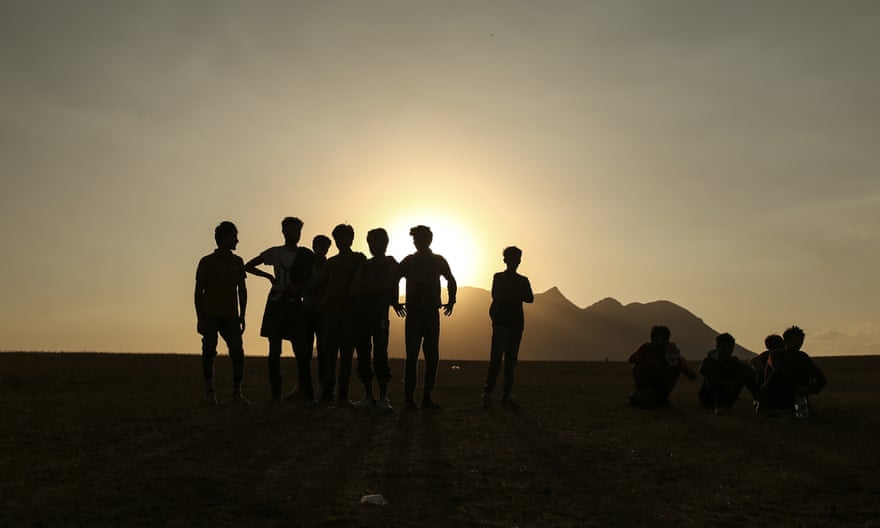
SHAHIN HAD BEEN battling the Taliban for more than a decade as an army officer and a member of a Pashtun clan opposed to the militant movement.
Serving in the army staff command, he worked closely with US forces, and when Kabul fell last summer, his old American friends put him on a high-priority evacuation list. By then, he had shed his military uniform and moved into a safe house. His father and mother also went into hiding after the Taliban captured his home province and confiscated the family house and lands.
A few days later, he received a code notifying him of the flight date and time. Twelve hours before his flight, he left his hiding place and headed to a designated meeting point. But half an hour later he heard the sound of an explosion and gunfire and saw people running away. Realising there had been a devastating attack – the bombing by an Islamic State franchise that ended up killing as many as 170 civilians and 13 US troops – he left quickly and went back to his hiding place.
The next day he returned to the airport. The gate was shut. He saw blood, mangled metal wires and clothes were strewn around. He inquired about his flight and the soldiers stationed there told him the gate was closed and no one was allowed in. He left, and for the first time in his life, he was really scared. The next day he packed a few things and decided to leave Afghanistan.
Fearing Taliban checkpoints installed along the roads, he decided to follow a longer and more circuitous route through the desert of Baluchistan, where the borders of Iran, Pakistan and Afghanistan meet. He travelled through the mountains along shepherd’s trails and village roads.
Finally, he crossed the Pakistani border in October. He and a few other men fleeing the Taliban spent their first night in the desert. When he woke up the next day, he was nearly buried in sand. After walking across a mountain, the group descended into the Iranian side of the desert, where smugglers were squeezing up to 45 people at a time on to pickup trucks. They sped across the border at night.
Muscled and compact, Shahin sat on a bench in a public park and spoke of his long journey with the precision of an experienced officer, drawing a route that took him across the Iranian cities of Zahedan, Isfahan, Kermanshah and then Tehran. While speaking, he kept toying with his military card as if it were a lucky charm.
He spent two weeks at a staging point near the border with dozens of Afghan families, each given an egg and a small piece of bread each day by the smugglers. Then the large group was split into smaller groups of about 50 people, each led by a smuggler, with the route marked on their mobile phones. Snow started falling, and in Shahin’s group, two families with 14 children between them fell behind. “The smuggler told us, ‘Don’t worry about the families, just go yourself,’” Shahin said. “I saw an old man with two women; he was carrying a child half frozen to death and could not walk.”
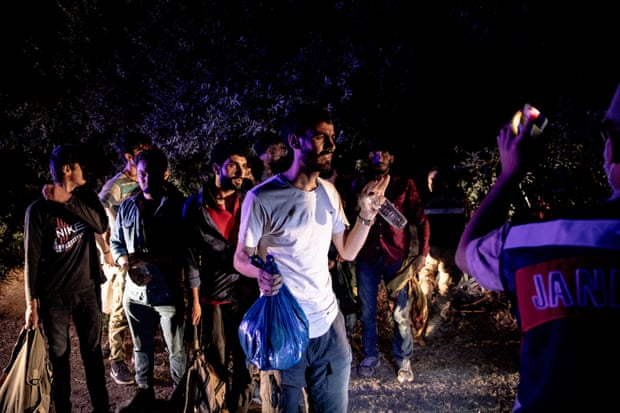
Shahin carried the child and walked beside the older man, wading through fresh snow and helping him and the women to climb down the trench at the border. By the time they climbed to the other side, the larger group had left them behind and they were lost in the snow.
The group walked until dawn until they came across a village where he knocked at the door of the first house. A woman opened it but refused to let them in, leading them instead into a half-destroyed barn. They shivered, wet and cold. He saw that the child was on the verge of dying, so he ripped off the barn door, broke it up and made a fire. Other families joined them. “There were children of all ages, from teenagers to infants.”
That evening, their smuggler located them and took them to a safe house where nearly 150 Afghans were hiding. The smuggler told them a bus would arrive to take them to Istanbul, but police raided the house that night and people tried to escape. Shahin jumped from the second floor and ran into nearby woodland with other men. The police fired flares, lighting the skies orange, but he hid under the branches and waited. His clothes now soaking wet, he shivered and thought he would die if he didn’t move. Police officers were still combing the streets for refugees, but he found a small bridge and hid underneath. He walked back and forth all night to warm his legs and keep himself from freezing. Another young refugee joined him, and in the morning they walked back to the town to get some help.
But no one was willing to help. A couple of shop owners kicked them out, but as they wandered in the streets, wet and cold, a man took pity on them and took them to his home, where his mother gave them hot milk, bread and honey.
As they warmed themselves, a young woman entered the room and – to their astonishment– spoke to them in Dari. “She told me she was a soldier and had served with a Turkish army unit stationed in Jalalabad for six months,” Shahin said. The acquaintance turned out to be a stroke of luck – her brother helped them reach the next town. Through a combination of taking buses and walking, he eventually arrived in Izmir, on the west coast of Turkey. From there, he thought, he could reach Europe.
“Three times, the Turkish police arrested me and took me to deportation camps, but when I showed them my military card, they took pity and let me go,” he said, placing the laminated card in his palm. “I will keep trying until I reach Europe or die.”
www.theguardian.com
George is Digismak’s reported cum editor with 13 years of experience in Journalism